#but the christian imagery aside
Explore tagged Tumblr posts
Text
Ahab glimpsing salvation and choosing to continue his path to certain damnation/destruction has me feeling all sorts of ways.
#whale weekly#i should try to elaborate when I'm not at a bar#but the christian imagery aside#this is such a classic moment in so much literature#human impulse and compulsion and even fate or destiny blamed for what is quite frankly our own heads fucking with us#a warped sense of justice turned to obsession gets called justice and revenge#anyway
8 notes
·
View notes
Text
🪽 Subtle Hermes Worship 📨
Keeping a journal of letters addressed to Hermes; you can also use a code name for him, such as "diary", if needed
Keeping a picture of him in your wallet
Collecting coins and shiny objects
Writing letters to friends or loved ones who live far away
Writing stories and poems
Having imagery of feathers, wings, turtles, or hares around (feathers and wings are especially good in a Christian household)
Having rabbit, turtle, sheep, hawk, or ram stuffed animals
Wearing jewelry that reminds you of him; a caduceus necklace is extremely easy to find online and is often associated with other things but is still a major symbol of Hermes
Having a candle that reminds you of him (no altar needed)
Dedicating any morning drinks to him (coffee, tea, energy drinks, etc.)
Participating in any sport
Making a list of jokes or quotes that make you laugh
Making a list of good memories
Watching comedians, live or online
Engaging in activities that bring you joy
Spending time with loved ones
Spending time with pets and bonding with them
Volunteering at a homeless or animal shelter
Honoring deceased loved ones, including pets
"Borrowing" things from big corporations
Setting money aside to save if/when possible
Exploring new places you've never been
Supporting small businesses
Taking a walk
Learning non-obvious forms of divination (cartomancy, shufflomancy, pyromancy, etc.)
Keeping a dream journal
Exercising if able; get some movement throughout the day
Creating something with your hands or imagination (writing, drawing, carving, something inventive and creative)
Donating items you no longer need
Buying a meal for someone who needs one
Showing kindness towards your fellow human
Making a list of things that made you happy throughout the day and that you're looking forward to
Carrying a good luck charm on you; keep a lucky coin
Collecting souvenirs from new places, even just the next town over
If you have a car or bike, show it some love
Be kind to animals; feed neighborhood dogs, cats, birds, etc.
Volunteer at an animal shelter or farm; volunteer at a homeless shelter
-
May add more later! This is my list of discreet ways to worship Hermes, so far. Please enjoy, and take care! 🧡
Link to Subtle Worship Master list
#helpol#hellenic polytheism#hellenic pagan#hermes deity#hermes worship#deity worship#paganblr#pagan tips
1K notes
·
View notes
Text
How can non-Jewish writers include Jewish characters in supernatural stories without erasing their religion in the process?
Anonymous asked:
I have a short story planned revolving around the supernatural with a Jewish character named Danielle (who uses they/them pronouns). Danielle will be one of a trio who will be solving the mystery of two brides' deaths on the day of their wedding. My concern with this is the possibility of accidentally invalidating Danielle's religion by focusing on a secular view of the afterlife. At the same time, I don't want to assume that Jewish people can't exist in paranormal stories, nor do I want to use cultural elements that don't belong to me. So, how do I make sure that Danielle is included in the plot without erasing their Jewishness?
Okay so to start with I think we need to ask a question about the premise: what is a secular afterlife? I’m not asking this to nitpick or be petty, but to offer you expanded ways of thinking through this issue and maybe others as well.
A Secular Afterlife
What is a secular afterlife? To begin with, I get what you mean. The idea of an afterlife we see in pop culture entities like ghost media owes more to a mixture of 19th-century spiritualist tropes drawn from titillating gothic novels than to anything preached from the pulpit of an organized house of worship. Yet those tropes--the ominous knocking noises from beyond, the spectral presences on daguerrotype prints, the sudden chill and the eerie glow, all of those rely on the idea of there being something beyond this life, some continuation of the spirit when the body has ceased to breathe. For that, you need to discount the ideas that the consciousness has moved on to another physical body and is currently living elsewhere, and that it was never separate from the body and has now ceased to exist. Can we say that this is secular?
More so: Gothic literature, as the name suggests, draws heavily on Catholic imagery, even when it avoids explicit references to Catholicism. Aside from the architectural imagery, Catholic religious symbols permeate the genre, as well as the larger horror and supernatural media genres that grew from it: Dracula flinches from a crucifix, priests expel demons from human bodies, Marley’s Ghost haunts Ebenezer Scrooge in chains. The concepts of heaven and hell, and nonhuman beings who dwell in those places, are critical to making the narratives work.
The basis also draws from a biblical story, that of the Witch of Endor. The main tropes of Victorian spiritualism are present: Saul never sees the ghost of Samuel, only the Witch of Endor is able to see “A divine being rising” from wherever he rises from, and her vague description, “I see an old man rising, wearing a robe,” evokes the cold readings of charlatan mediums into the present (Indeed, some rabbinic sources commenting on this assert that this is exactly what was going on).
While neither of these views of its origin define the genre as the sole property of Catholicism--or of Judaism for that matter--it would be hard exactly to categorize them as secular.
A Jewish Perspective on ghosts
However, it’s not the case that ghost media is incompatible with Jewishness, assuming that it doesn’t commit to a view of heaven and hell duality that specifically embraces a Christian spiritual framework.
Jewish theology is noncommittal on the subject of the afterlife. The idea of a division between body and soul in the first place is found in ancient Egypt, for instance, earlier than the earliest Jewish texts. In Jewish text it’s present in narratives like the creation story, in which God crafts a human body out of earth and then breathes life into it once it’s complete. It also appears in our liturgy: the blessings prescribed to be recited at the beginning of the day juxtapose Elohai Neshama, a blessing for the soul, with Asher Yatzar, expressing gratitude for the body, recited by many after successfully using the bathroom.
Yet it’s not clear that this life-force is something separate than the body that lives beyond it, until the apparition of the Witch of Endor. The words we use to describe it, whatever it is, evoke the process of breathing rather than that of eternal life: either ruach (spirit, or wind) or neshama (soul, or breath): neither is a commitment to the idea that it does--or that it doesn’t--go somewhere else when the body returns to the earth.
Jewish folklore, however, leans into the idea of ghosts and other spiritual beings inhabiting the earthly plane (and others). Perhaps most famous is the 1937 movie The Dybbuk, in which a young scholar engaging in kabbalistic practices calls upon dark forces to unite him and his fated love, only to find himself possessing her body as a dybbuk. It appears that he is about to be successfully exorcized, but ultimately when his soul leaves her body, hers does as well.
More relevantly to your story, a Jewish folktale inspired the movie The Corpse Bride. In the folktale version, a newly-engaged man jokingly recites the legal formula he will soon recite at his wedding, and places his ring on the finger of a nearby corpse--a reference to a time when antisemitic violence is said to have gotten worse not only at Jewish and Christian holidays as it does still to this day, but around Jewish weddings as well. The murdered bride stands up, a corpse reanimated complete with consciousness, and demands that the bridegroom honor his legal obligation.
In the movie, the bride gives up her demand willingly: her claim on him is emotional rather than legal, and she finally accepts that he has an emotional connection with another person, that he doesn’t love her. In the folk tale, the dead woman takes him to court to decide whether their marriage is legal, since he spoke the legal words to her in front of witnesses as is required, and the court rules that the dead do not have the right to make legal demands on the living. In this version, the moral of the story is that a legal formula is an obligation; that when he jokingly bound himself to the corpse, he not only disrespected the dead but also the legal framework that structures society, and by so doing risked being obligated to keep his side of a contract he never intended to enact.
This speaks to the ways that a Jewish outlook can differ from a Christian-influenced “secular” one. Christian-influenced cultural ideas can often focus around feeling the right thing, while Jewish stories will often center on doing the right thing. Does the Corpse Bride leave because she realizes she is not the one he loves? Because she--or he--learned a valuable lesson? Or because she loses her court case? It’s not that the boy’s emotions are irrelevant to the story--the tension, the suspense, the horror of the story takes place primarily within the boy’s emotional landscape--but emotions on their own are not a solution. The question “should he marry her” can be answered emotionally, but “has he married her” can only be answered by a legal expert, and once it has been the deceased bride may not have changed her emotional attachment to him, but she no longer has legal standing to pursue her claim.
Centering legal rectitude over emotional catharsis isn’t a requirement for having Jewish characters in your story, but it’s worth thinking about what is and isn’t universal, what is and isn’t actually all that secular.
Meanwhile, back at the topic:
Where does any of this place Danielle?
Well, unless you’re positing a universe in which Christian or other deities or cosmologies are confirmed to exist (See Jewish characters in a universe with author-created fictional pantheons for more on that topic), there’s no reason why they shouldn’t be perfectly fine interacting with whatever the setting you’re building throws at them.
My wishlist for this character and setting runs more to the general things to consider when writing fantasy settings with Jewish characters:
Don’t confirm or imply that Jesus is a divine being. That means no supernatural items like splinters of the cross, grails, nails, veils, etc. There’s nothing particularly powerful or empowering about this one guy who lived and died like so many others.
Don’t show God’s body and especially not God’s face, or confirm that any other gods or deities exist, whether that’s Jesus, Aphrodite, or Anubis, or someone you made up for the context.
Don’t put Danielle in a position where they’re going to play into an antisemitic trope like child murder, blood drinking, world domination, or financial greed. If you have to, name it and let Danielle express discomfort with or distaste for those actions both because Jewish values explicitly oppose all of those things but also because Danielle as a Jewish character would be painfully aware of these stereotypes as present and historical excuses for antisemitic violence.
Do consider what Danielle’s personal practice might look like. What does Danielle do on Shabbat? What do they eat or refrain from eating? What are their memories of Jewish holidays and how is their current holiday observance different than their childhood? I know I say “Jewishness is diverse” on every ask, but it is, and these questions--which also underscore how very much Judaism is rooted in one’s actions during this life--will help you develop how Judaism actually functions to inform Danielle’s character, even if you don’t spell out the answers to each of these questions in text.
Do let Danielle find joy, comfort, and identity in their Jewishness not just in contrast with Christianity but simply because it’s part of the wholeness of their character. I know the primary representation of Jewishness is a snappy one-liner in a Christmas episode followed by the Jewish character joining in the Christmas spirit, blue edition, but make room for Jewishness to inform how Danielle approaches the events of your story, or why they decide to get or stay involved.
-Meir
Hi it’s Shira with some Jewish ghost story recs written from inside–
When The Angels Left the Old Country by Sacha Lamb (deliriously good queer YA Jewish paranormal, mainstream enough that it’s got a good chance of being at your local library and won all kinds of awards)
The Dyke and the Dybbuk by Ellen Galford (sorry for the slur, warning for a paragraph of biphobia in the book but it’s an older book. I read this right before my divorce so my memories are super fuzzy but it’s about this modern day lesbian who gets possessed by the ghost of a different lesbian from hundreds of years earlier in Jewish history.) Nine of Swords Reversed by Xan West z’L of blessed memory - another queer Jewish paranormal.
The general plot is that two partners are struggling with how to be honest with each other about the effect disability is having on them. It’s got a very warm and fuzzy cozy vibe but kink culture is central to the worldbuilding so if that isn’t your vibe I didn’t want you to go in unaware.
The Dybbuk in Love by Sonya Taaffe. I don’t remember the details but I remember loving it, it’s m/f and romance between possessor and possessed.
I wrote a really short one called A Man of Taste where a gentile vampire woman and a Jewish ghost/dybbuk get together.
~S
1K notes
·
View notes
Text
Warnings: MDNI. fingering, male masturbation, mentions of stalking, use of christian imagery. Don’t read if you’re sensitive or shit LMFAOO. don’t like it? Scroll.
a/n: I fucking hate this :p
based off of this moodboard

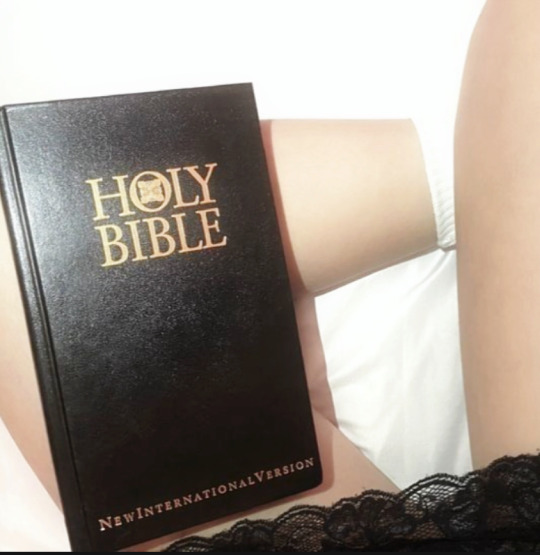

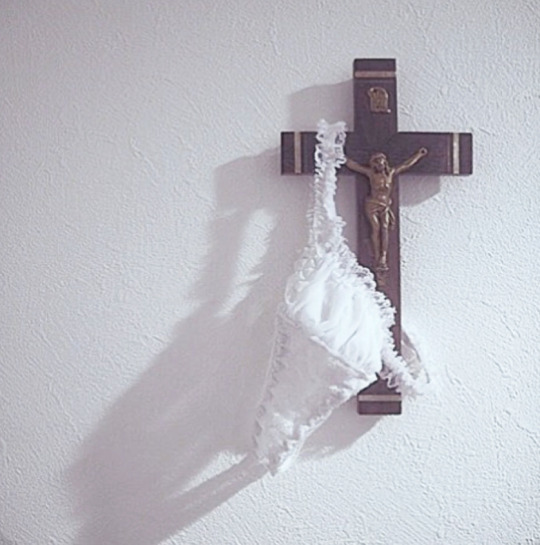
Rafe Cameron knew who you really were.
He knew that you weren’t the innocent girl you pretended to be. He knew that you weren’t really as pure as you said you were. He knew you. Inside and out. He knew you were a sinner.
He had been watching you. At church, through your window, the beach. Everywhere you went, he had his eyes on you. You didn’t know it, of course, bless your oblivious heart.
And he watched you while you were tempted by the devil himself. You had the same routine every night. After showering, you went back into your room, got dressed in a white nightgown.
Then, you got on your knees, clasped your hands together, asking God for the strength to stop the lustful thoughts that invaded your mind every night. Of course, it never worked, because like clockwork, every night, your hands were underneath the covers, your panties pulled aside, your fingers working on your clit.
Rafe watched eagerly each time, matching his strokes on his cock to the speed your fingers worked under the covers. You both came at the same time, you letting out a sigh and shaking your head, clasping your hands together again, now begging for forgiveness.
You’re a sinner. And Rafe Cameron knows it. He’s seen you lose the internal battle. And if you were a sinner? Rafe was the devil coaxing you into his bed.
He had a grin like the Cheshire cat on his face as he hovered on top of you.
“Rafe, we- we can’t! It’s sinful, and if my pa finds out-“
“Every night I- I watch you. And I- I know what you do… so don’t give me that ‘it’s sinful’ bullshit.” He stammered out, watching you cower underneath him. It made him feel powerful.
“I… w-wha-what are you talking about?” You asked him, furrowing your eyebrows.
“The innocent acts over, y/n.” He told you, the pout forming on your lips making his cock twitch inside his pants. He leaned down again. “You’re a sinner.”
When his lips went to your neck, you had submitted, your protests stopping in your throat. You let out a low moan, squirming under him.
Rafe Cameron knew who you really were. A fucking sinner.
#pastors daughter reader#rafe cameron x reader#rafe cameron#rafe cameron x you#rafe cameron x y/n#obx rafe cameron#rafe cameron smut#rafe cameron blurb#rafe cameron x female reader#rafe cameron x smut#rafe x you#rafe smut#rafe cameron prompt
741 notes
·
View notes
Text
What Weighs in Your Heart.
+18, mdni
(priest coriolanus x f. reader, mdni!)
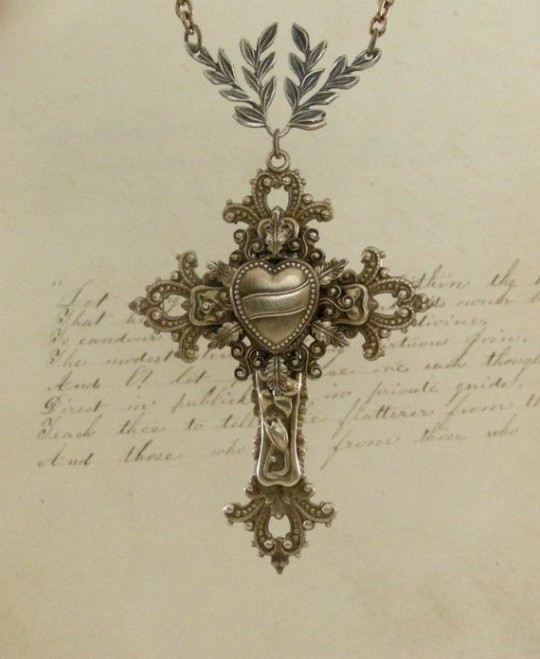
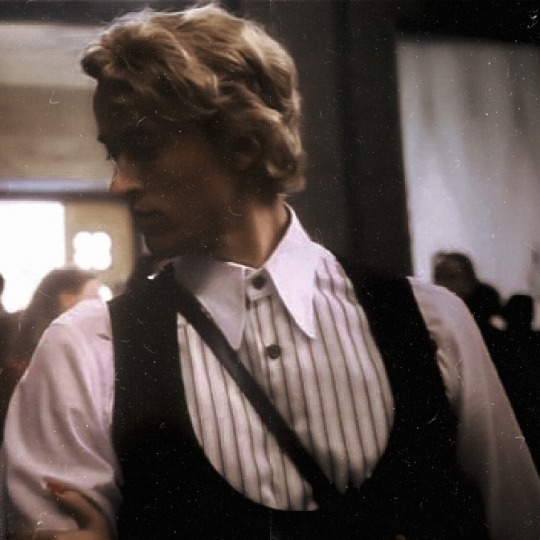
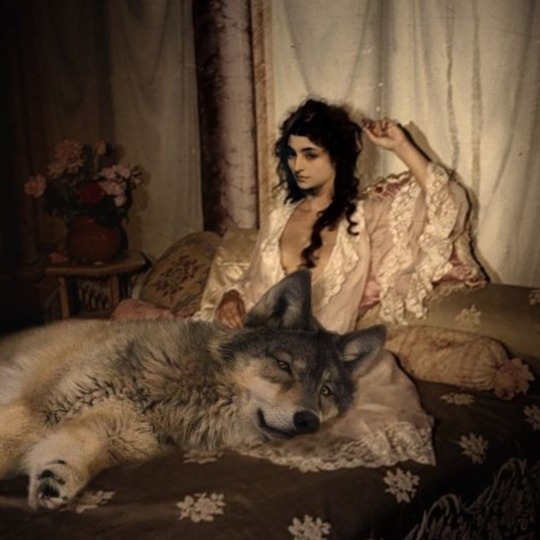
summary: the priest of panem's church was the one you confided the most, that's the only reason for you to confess your sins every sunday evening, and that's why you always stayed until late at church.
c.w: priest!coriolanus, christian reader, christian guilt, altar sex, slapping, mentions to blowjob, grinding, fingering, squirting, church sex, dirty talk, smut, nsfw, public sex, dacryphilia, degrading, praising, overstimulation, sub reader, religious imagery mentioned, priest kink, praying during sex, sex in public place, mdni!!

the sin - heinrich lossow, 1880.
a piece showing a nun moans and a priest holds her hips. based on the events of the last day of October 1501, where cardinal cesare de borgia, son of Pope Alexander VI, supposedly hosted a decadent dinner party.
⠀⠀⠀⠀⠀⠀⠀⠀⠀⠀⠀⠀⠀⠀⠀⠀⠀⠀༺ ♱ ༻
every sunday, you spend your whole evening at the church, always so eager to please your religion and your god, but you knew deep in your heart that this was not your true intention.
you've waited until everybody left the church again, so you could ask father coriolanus to listen to your regrets on the confessionary – that's how far you can remember –, and with your moans echoing through the church and your pussy gushing around his skilled fingers, you cried out in pleasure, hearing his prays.
both of you weren't anywhere near the confessionary, if you looked up you could see the stained glass window with a image of Jesus Christ looking at you, and you'd immediatly look down again, the wet sounds of your cunt echoing through your eardrums.
"that the eyes of your heart may be enlighted, so you can repent for your sins and your place in heaven is reserved." he prayed, his fingers fucking your pussy relentlessly while his other hand held a rosary, praying for you. "tell me what weighs within your heart, my child."
you couldn't even speak an entire phrase without moaning, you didn't have any idea you were so wet and sensitive until the moment he pulled your panties aside.
"you didn't hear me?" he asked, curling his long fingers into your cunt. "confess me your sins."
you gulped down, crying from guilt and pleasure all at once.
"forgive me, f..father, for i have sinned." you started, legs spreading a bit more just so you could be met with a slap on your ass and a finger thrusting into your core. "fuck, father. i-i can't- i can't sp...speak!"
your eyes were closed shut, your mouth opened up to let him hear your squeal once he slapped your butt.
"the church is not a place for you to run your dirty mouth like that." he warned you, taking his fingers out of your core and making you suck on them.
"i'm sorry, father. please forgive me." you said, eyes swelling up with tears as he frowned at you, shaking his head negatively.
"tell me what weighs in your heart, so i can show you the path of god, my dear lamb." he said, both his hands on your hips while you shamelessly whined, grinding your hips on his stiffened dick.
"forgive me, father, for i haven't stopped sinning kn every lord's day and can't stop coming to the church only to sin." you said, your voice sounding to malicious to your liking. you truly hoped god would help you, the guilt in your heart was nothing near the pleasure you experimented on coriolanus's dick. "father, please. i can't stop thinking about you," you admitted, your own hand travelling down your stomach to reach for your swollen clit.
an action that, much to your sadness, was prevented by the priest towering on you. his hand held yours, caging them with the rosemary he held.
"you should know better than to indulge in such a dirty path, little lamb." he said, in a soothing voice while you thrusted back at him, crying for release. "look at you, you're on the right path to become satan's main worshipper. you're so dirty, so stained." you cried upon hearing those words.
"it is not my fault, father, i swear!" you cried out, your core clenching on air as it missed his cock inside you, throbbing inside you while he usually hit your ass. "it's not my fault! i-in god's plan, he made the devil so much stronger than any of those whose flesh is the main pleasure-" he gave you another painful slap, your lips gasping as the tears rolled down your cheek.
"so now it is god's fault that you are such a whore?" he asked you, grinding back at you, you mewled at his words.
"n-no, that was not what i said-"
"it is exactly what you said, lamb. you should watch your words." he said, the stern tone on your voice made you sob.
"i'm sorry, father. i'm sorry, i wasn't thinking straight, i- ah!" you sobbed, feeling the tip of his cock entering your core, your cries were too pleasant for him.
"this is what you wanted, right? this is why you're always here, looking at me with those pleading eyes that are always screaming 'fuck me, father.' isn't that right?" he asked you, a smirk curling into your lips as you nodded pathetically. "you can't help but crave what is not yours to have, can you? even if it's a priest's cock. i bet you fucked more priests in this life than any prostitute." he whispered into your ear, thrusting slowly into your pussy with a tortuous rhythm.
your brain felt too mushed up for you to even talk, so you sticked up with shaking your head negatively, your moans and cries being paused for you to mewl a bunch of no's.
"use your words, you are a bitch, but you're not dumb and nor are you mute." he said, his cock entering you entirely, filling you to the edge as you cried out in pleasure, his hand grabbed your boob aggressively, pinching your nipple as he turned you to face him. "do what i said."
"'m sorry, fa.. father! i'm sorry. i-i didn't fuck any priest other than you, i promise!" you cried out, the tip of his cock teasing your clit before entering you again.
"see? it wasn't that hard speaking up and using your voice for something other than begging for my dick." he said, looking into your eyes, and the smile he gave you was so pretty that you just knew that fucking in missionary would end up with you saying something forbidden, something dirty. he was right, you were stained after all. "you're such a good girl, can't believe you go around with my cum in your pussy looking that innocent." he chuckled.
he put your handcuffed hands on his neck, making you hug his neck before he made one of your legs wrap around him, thrusting into you until his tip teased just the right spot inside you.
"fuck! father, please, keep going!" you begged, crying as your head hide on the curvature of his neck.
he tugged your hair back, making your eyes meet his, the ones you were trying your best to avoid, the ones you knew that once you looked into, you would see the abyss of the fire of hell waiting for you. he leaned closer to you, his face mere inches of yours. he couldn't kiss you, no. it'd make everything worse- but god, his lips looked so pretty. so kissable. you wanted him to, and inside of you, your heart prayed he would. but he didn’t.
"you're so eager." he smiled, groaning as you squeezed his cock between your gummy warm walls and cried while he nibbled om your neck and earlobe. "but you heard what i said about your language. the church is no place for that." he said.
"but you- hah, god! y-you're always cussing around too! y-you called me a whore just two minutes ago!" you cried out, defending yourself in this situation was pathetic.
"because you are one, lamb." he said, chuckling as he kissed your tears on the right corner of your mouth. too close to your lips. "my language can be excused when i'm telling the truth," he paused, growling while his forehead leaned into yours. "your language, however, is just a bunch of fucks."
"f-father, please don't." you said, moaning while trying your best to pull away from his lips.
"'don't', what? 'don't cum inside this time'? 'don't suck on my neck'?" he asked, his eyes boring into yours as he thrusted faster and deeper into you. ah, you always looked so pretty when he fucked you and messed you up, such a slutty mess.
"d..don't kiss me," you said, for his surprise. and he chuckled at you. you could handle fucking a priest but couldn't handle a kiss? how cute. "you're too close to me, y-your lips- i want you to."
"be more specific," he groaned, his hips slapping in yours as his cock hit your cervix and his hand slapped your ass. "you want me to do what, dear?"
"i want you to kiss me." you pleaded, crying from humiliation.
"you told me not to." he said, teasing you as his thumb rubbed on your clit, making your walls squeeze him. he gasped, soft grunts leaving his mouth as he frowned, looking down to see his cock disappearing inside your pussy with each thrust.
"please do. p-please, please." you begged. this wasn't the first time you fucked him, but it would be the first time you kissed him, and in general, it would be the first time you kissed at all. "just this once. j-just today."
"pray." he demanded.
"what? no- not now. it's wrong. it's dirty" you sobbed.
"just like you. pray." he said again, torturing you as he montioned his hips in a slow, steady place. you gulped down, apologizing to jesus mentally before commiting the terrible sin you were about to.
"o-our father, who art in heaven, hallowed by thy name, thy kingdom come-" you cried, your heart heavy with guilt. "t..thy will be done on earth as it is in heaven, give us this day our daily bread, and forgive us our trespasses." you closed your eyes shut, overstimulation hitting you like a brick as you sobbed.
he begin thrusting faster in you, your voice melting at each rapid thrust that hit your uterus, his cock entering deep inside you, his balls kissing your core as his member throbbed inside you. "keep going." he said, and so you did.
"as we- ugh, coryo! as we forgive, those who- who tre... who trespass against us," you groaned, feeling your climax arriving. you held yourself, prohibiting yourself from cumming in such a time. "and lead us not into temptation, but deliver us from evil,"
he kissed you, his tongue tangled on yours. such a filthy kiss, such a messy kiss, took you over the edge. his hand brought you closer by your waist, fucking you relentlessly while his other hand held your head, kissing you roughly. you came first than him, a wet mess being made on him as you squirt on him, moaning into the kiss as he kept going, cumming inside you right after you.
"a...amen." you finished, shaking as he pulled his cock from you, kissing your tears alway.
"good girl." he said, kissing your temple. you pouted as he cleaned your tears, and after straightening your clothes and pulling his pants back, you were still shaking, your legs trembling from the intense orgasm you just had. "be a good lamb and sit there while i bring you water and clean myself, okay?"
and you nodded obediently, sitting on the first bench you could reach.
he was so gentle to you. so good. your brain thanked heavens that he made you pray during that, even if it was the biggest sin you've commited, you knew that if he hadn't done such a thing, you would tell him you loved him.
fuck, you're a terrible christian. and to think your parents were so proud of you being such a church girl.

tagging: @tiaamberxx
#coriolanus snow x reader#young coriolanus snow#the hunger games the ballad of songbirds & snakes#young president snow#coriolanus snow fanfiction#coriolanus snow imagine#tbosas smut#coriolanus x reader#coriolanus x you#x reader#18+ mdni#mdni#coriolanus smut#smut#priest.kink#tbosas fanfiction#fanfiction
968 notes
·
View notes
Note
Hi! I saw your post about the appropriation of religious imagery by extremest hate groups (a good post, I share your feelings of frustration) at the end you made a vague statement about the satanic temple and was wondering if you could elaborate on what happened there? They are a group I admittedly only have passing knowledge of, but what I have seen has usually been pro LGBTQ advocacy or similar things. Not that I don't believe you- I don't really interact with large institutions because they tend to become inevitably corrupt and have inherent gatekeeping, but I was wondering if you wouldn't mind explaining what exactly or which extremist propaganda they have been aligning with recently? Or is it just because they are generally anti-theistic?
(I have, in fact, been almost literally living under a rock the past few years so I apologize if the answer is something obvious, but I couldn't seem to find anything with cursory searches so thought asking someone in the community would be a better source)
I couldn’t even begin to outline all of the terrible shit the leaders and founders of The Satanic Temple have done over the years. They are a group of alt white scammers using progressive ideology and leftist sympathy to fill their pockets. They use their image to pray on young women at sex parties and employ real cult tactics to isolate and abuse them. They are a company comprised of sexual abusers, manipulators, and fascists parading the name of Satan to manipulate actual Satanists and Luciferians into giving them money, despite never showing any real respect to those philosophies or religions. We all already know they’re not theistic satanists and they don’t really worship Satan, but they also have absolutely no relationship with Satanism or Luciferian gnosis. You cannot be a Luciferian or a Satanist and be friends with Nazis. Idgaf call me a gatekeeper. They just like to use the image of Satan for publicity stunts to ruffle the feathers of a few Christians. They do not embody the Luciferian spirit or the values of Satanism.
I have a deep hatred in my soul for Douglas Mesner and how much damage he has done to the image of Luciferianism and Satanism, not to mention the real world damage they have done to abortion advocacy groups. The strategic moves of opposing institutions that oppose LGBT rights has actually given a bad name to good faith organizations who already have enough negative stigma around them. Abortion advocacy groups don’t need the narrative that they’re sacrificing babies to Satan by being supported by the Temple of Satan on top of all the backlash they already receive by Christo-fascists.
They DO NOT use the money donated for abortion advocacy to help young mothers or to fight real cases of human rights abuse, they have never actually helped a real woman obtain healthcare. The leader himself openly admitted to taking money donated to the Satanic Temple to pay his personal bills.
Asides from the plethora of real accusations of sexual assault and violence against female members of the church itself, the leader Douglas Mesner has actively supported abusers and suppressed victims from WITHIN THE CHURCH!! (kicking them out, harassing them, threatening them lawsuits etc) from obtaining justice. They have never made any actual strides in the fight towards liberation and have actively supported real fascists for years now. Douglas Mesner has advocated for eugenics and made horrible anti semitic and racist comments in the past and continues to support alt right nationalists who actively spread hateful rhetoric. The lie they promote of wanting to protect women’s and LGBT rights is a well crafted marketing scheme to give them a good image while they abuse and manipulate their own members behind the scenes.
This is a fantastic video essay that dives deep into the history of the members and their controversies:
youtube
Genuinely, from the bottom of my heart,
FUCK THE SATANIC TEMPLE
There are of course members who are great people who truly take the philosophy to heart, who have seriously fought for liberation and have sadly had their empathy hijacked. But I don’t like cops and I don’t like people who support Douglas Mesner and his band of freaks. They cannot be trusted and they have done far more harm than good. Actions speak louder than words.
#satanic#satanism#the satanic temple#demonology#demonolatry#luciferian witch#luciferism#luciferian#lucifer devotee#theistic luciferianism#lucifer deity#lord lucifer#lucifer
90 notes
·
View notes
Text
The Dragonscale Amulet: Theory
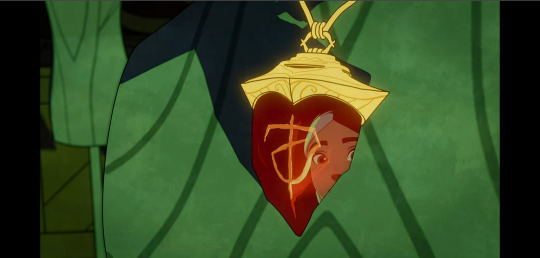
And finally... literally the reason I made this entire blog. Basically, back in March we had this:

Anyway, I dropped literally everything to catalog the entire breadth of writing, runes, glyphs, etc. in the series so far, all in order to figure out what the hell this means. One theory that has evolved in the meantime is that the symbol on the amulet represents an acorn or seed, but I would like to propose another.
First, let's look at the amulet and symbol, themselves.
The amulet is composed of a dragon scale (allegedly, at least... we haven't seen dragon scales separated from dragons anywhere else) that is red, highly reflective (whether naturally or polished after the fact), and about palm-sized. By that scale, it probably comes from a dragon about Pyrrah's size or a little larger, unless it was carved down to a smaller size when crafted into an amulet. The scale is anchored in a gold setting, with a shape and decorations that have a fair amount of similarity to the Staff of Ziard. (Maybe we should have anticipated an Aaravos/Startouch association.)
As for the symbol, accounting for perspective (to the best of my abilities), we have this:

The symbol is etched directly into the scale's surface. Its lines are less smooth than the ones decorating the setting, which could indicate that it was added at another time (earlier/later) with a less precise tool, or just that gouging designs into dragon scales is hard.
In terms of similarity to other symbols we've seen so far, it could come from a similar system as the symbols in Infantis Sanguine. It also has similarities to a primal rune, though the sharp, wide corners are unusual. Either way, I think this is a pictographic symbol representing an item or concept as a whole, not an alphabetic character—this isn't Laurelion personally going around with a blinged-out "L" necklace.
So what could it be? Well, I propose that it's a heart. Like so:

My initial impression had the horizontal top "crossbar" as the pulmonary arteries, and the vertical center line as the aorta/vena cava, but you could also look at the crossing vertical and diagonal lines as dividing the space into the four chambers of the heart. However, I think there's another direction to go with that diagonal, so let's put a pin in that for a moment.
Why a heart? Because there has a sizeable amount of fairly convincing speculation post-s4 that the dark space in Aaravos's chest is either figuratively or literally representing his heart having been removed. @raayllum's are a lot more coherent, but I've also done my share.

I'm sure someone had this thought before I did, if only because I was super late to the fandom. But I had it!
... okay right, back to the amulet.
Aaravos's heart is also a key part of the "Laurelion and Aaravos are the same person" theory, in part because Laurelion's heart is the center of everything we currently know about them.


Laurelion's heart was pierced by either the as-yet-unnamed Novablade itself or a piece of draconic ivory (i.e. a dragon's tooth) that was later forged into the Novablade, after which "immortal Laurelion was no more."
Aside from creating an additional connection between Laurelion and dragons, making the dragon scale of the amulet even more interesting, let's go back to the symbol in light of the whole "pierced" thing.
Now, TDP has a fair amount of Christian symbolism and imagery to it, some purely because of how deeply Christianity is embedded in western culture but some also definitely intentional. Aaravos was initially framed as a Prometheus figure, but it became progressively more clear that he's a Lucifer one—a tempter, a rebel angel, out to destroy creation. They absolutely know what they're doing with things like the *checks watch* 2019 Aaravos birthday post:

So don't think it's completely insane to take that, Laurelion's death[citation needed], and the amulet symbol, and think of this:

Depictions of the Sacred Heart don't seem to usually show the spear, just the wound, but I wasn't raised Catholic so work with me here. (If you want to get even more Catholic, there's also the Immaculate Heart of Mary, which is almost always depicted with a sword piercing it diagonally all the way through because she's... sad? Look, I don't know.) The idea is that it represents the boundless and fervent love of God expressed through the suffering of Jesus, which... whatever.
I do think it's interesting, however, that we are primed to question Laurelion's "death" and concepts of mortality/immortality, death of identity, etc. in the context of Startouch elves because while there's definitely a possibility that an immortal being stripped of their immortality is a punishment, there's also... a lot of cultural precedent for that as a willing gift of love to a mortal/mortals, whether you're looking at Jesus, Castor and Pollux, or Arwen and Aragorn. So we'll see how that plays out.
Anyway, that's my weird fringe theory: the amulet symbol represents Laurelion's pierced heart.
Probably time to worry about Claudia. (As if we weren't, already.)
Bonus:


66 notes
·
View notes
Text
I don't know why this feels like such a revelation, but after watching the latest Moffat episode of Doctor Who, it clicked for me that the core difference between RTD and Moffat Who is that to RTD, the Doctor is God (or a metaphorical substitute for God), while Moffat's Doctor is a man in need of God.
Like, it's obvious RTD deifies the Doctor. The imagery is not subtle. And Moffat's Doctor is obviously a much more fallible man. But I hadn't fully considered how this affects the kinds of stories they tell.
In RTD's Who, the Doctor is someone who comes into a mundane human existence and gives it meaning. An encounter with the Doctor changes your life forever. You would follow him to the end of the universe if he asked, because life with him is infinitely better than life without him. Humans who try to reach the Doctor's level are struck down, because mere mortals cannot rise to the level of godhood. From a Christian perspective, this offers valid storytelling possibilities ("Human Nature/The Family of Blood", with its musings upon the Incarnation, fits perfectly in this era), but it does have the Doctor standing in the place of God, which suggests that the universe of RTD's worldview doesn't have one and needs the Doctor to fill that gap.
In Moffat's Who, on the other hand, the Doctor is a wondrous, impossible, legendary being--but still just a man. He can guide you through some of the best or most terrifying moments of your life--but your life has meaning outside of him. His companions learn over and over again the perils of relying on him too completely. Ordinary people can be just as good--or better--than him, because the Doctor is just another man, growing and changing and trying to find his place in the universe.
Moffat's Doctor is extremely aware that he's in a story--and he is not the author. In "The Doctor Dances" he is aware of how death-filled his stories usually are, and is ecstatically grateful when he is permitted a story where everybody lives. In "Blink", he and Sally are both following a script--but neither one of them wrote it; though they have free will, this story came from outside of them. Of course, these are examples of Moffat's meta exploration of storytelling--but the fact remains that his Doctor exists in a world where there is a greater force that runs everything.
And the Doctor resists this. He remains skeptical, arrogant, independent--but he is always searching for something more.
All this crystallized when watching "Boom". There, the Doctor is facing soldiers in a religious war, and he sneers that they didn't notice anything fishy because they "had faith, which keeps you from ever having to think for yourself." Those are the brutal words of every hackneyed internet atheist, and since the soldiers were wrong to have faith in this war, it seems like the story's saying the Doctor's right, and religion's just the "opiate of the masses".
And yet.
The episode ends with the Doctor telling a little girl to hold onto faith, and when the religious character points out that the Doctor was stridently against faith, the Doctor replies, "Just because I don't like it doesn't mean I don't need it."
Isn't that the Christian experience in a nutshell? How many of us are tempted to think that life would be so much easier if we didn't follow God? And yet we can't leave it aside because we need God. We need meaning outside ourselves, and life with God is better than life without him.
But this isn't the Whedon-ish universe where it doesn't matter if it's true so long as believing does something good for you. There is objective truth, and the Doctor is aware of it. He is aware that love is the most powerful force in the universe. (God is love). He is aware that everyone and everything dies, yet knows that something lingers on. (God is stronger than death). The Doctor is in a world where God exists, and even if he (or his writer) doesn't know it, he needs him, is searching for him, and to some extent, believes in him, because he can't deny these truths that he's seen. And I cannot get over how many different ways Moffat has been exploring these themes all these years.
#doctor who#steven moffat#catholic things#i went to that episode hoping to see the usual themes#but i didn't expect to see them escalated to the ultimate extent#i am going to be thinking about that ending scene for the rest of my life#i know i've always said moffat's who is catholic but this is the first time i've thought the doctor could be catholic
106 notes
·
View notes
Text
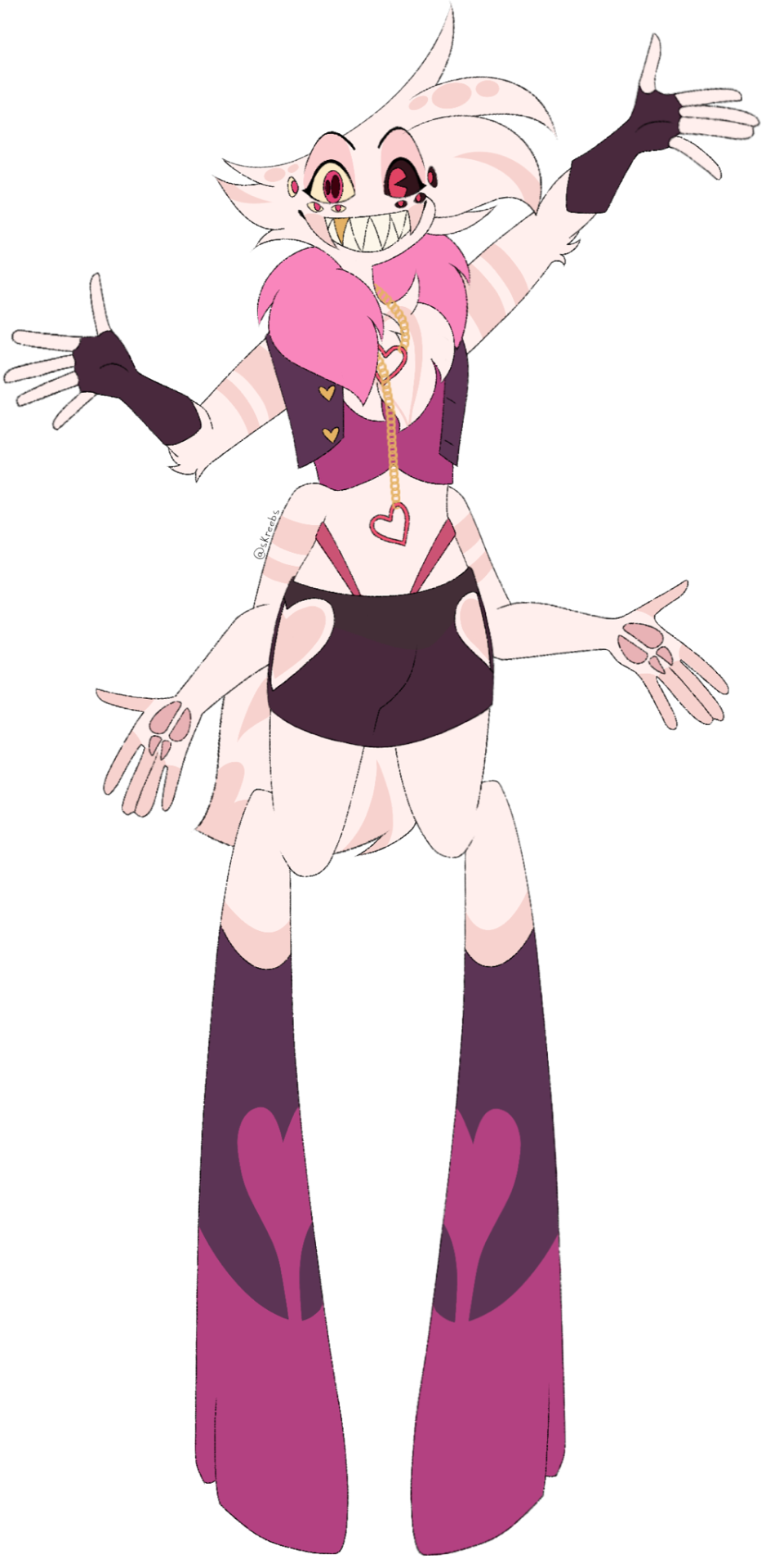
Angel Dust Redesign! (7/7)
FINALLY I AM DONE WITH THE MAIN 7 FREAKS.
Depending how I feel I might throw in some bonuses but these guys are your only guarantees! Going to be posting the full lineup separately because I don’t want to clutter this post!!
God okay where to start. I was talking about them in Husk’s post so let’s go with that. Angel’s clothing restrictions are his necklace and shoes. I might go on a bit of a tangent with this so forgive me 💔
For the necklace let me get this out of the way: yes it is a BDSM thing! I’m terrified people are going to take this as me being a weirdo but please as an adult content creator give me some space to explain before anyone jumps on me and hits me with a metal pipe. The intentions behind symbolism matter HEAVILY. I am against Vivzie’s portrayal of Angel’s abuse and the chain/collar imagery because it is blatantly either her being incredibly uncreative or her inserting her kinks into her shows. I think it is completely fine to use suggestive items in this way as long as the intentions are clear and not just there for no reason.
I would’ve probably done something else like a corset as a restriction, but I’d like to stop being so shy about Angel’s actual job. He is a pornstar and removing that outward aspect of him is taking a big chunk of his character away. I need more people to acknowledge that Angel enjoys sex and actively wanted to explore this side of himself. With the slip chain however, I would also like to portray how things Angel enjoys in his job have been used against him and made him come to resent what he does when he is forced into it. I think thats a pretty understandable thing to show.
This is harder to explain but the gist of it is just don’t be afraid to acknowledge Angel’s job. It’s okay to use sexual things as metaphors. Have you heard any christian song ever/hj
Alright with that out of the way, with the shoes. Angel’s feet are a large insecurity and discomfort of his which already makes his shoes some sort of restriction on their own, however if controlled, they can be made to stumble forward, fall over, etc. I wanted to show how Angel has freedom to go mostly wherever he pleases, though once again, that free will can be taken away very quickly.
I hated his suit so all suiting is gone entirely. He’s supposed to look attractive or eye catching at the very least. I’ve also added back the outer fangs he had in my first redesign!
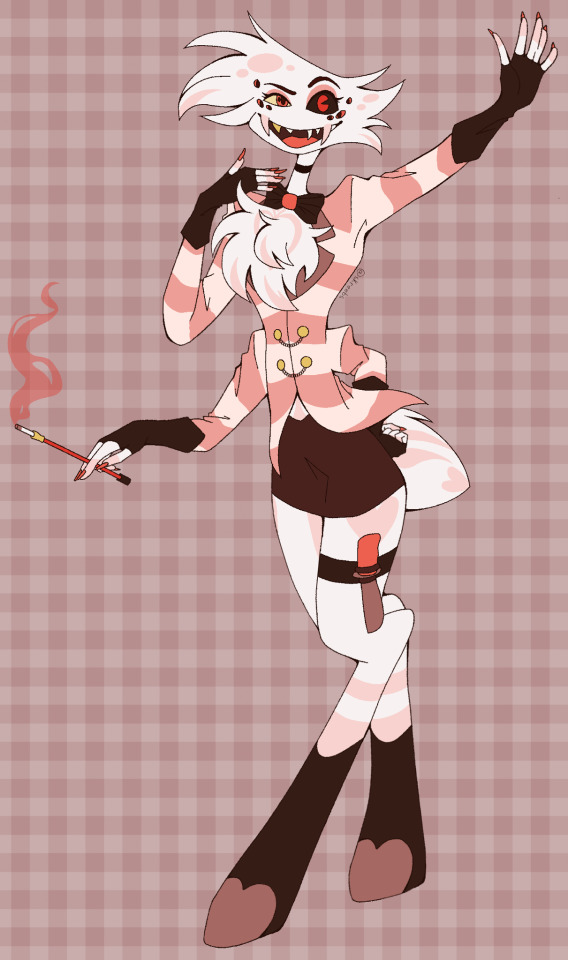
I am much happier with the new one in comparison to this old guy. I know it’s only a few months old but you can really see how differently I draw him and the details I pay attention to more like the shape of his hair. Aside from the old one! I wanted Angel himself to still keep the reddish pink to show wrath and destain being masked as lust, except now his clothing is actually the pinkish-purple lust colour and it covers more eye grabbing parts of his body like the chest, hands, hips, and so on.
I don’t think I’ve ever outwardly mentioned Angel having polycoria but he does and it’s probably my favourite feature to draw aside from his hair. About the hair and fur: Angel used to have spots and basic stripes before his contract with Valentino, where afterwards they began to curl into their cordiform shapes. Most physical overlord changes with hair and skin tend to not go away, so depending on who you make a contract with it’s either a fun perk or a sort of scar.
Once again, not sure if I will be continuing with anymore in this specific lineup, but if I do end up posting more of these I really hope you like those too! 💣
#hazbin hotel#hazbin critical#hazbin hotel criticism#hazbin hotel critical#angel dust#hazbin angel dust#hazbin angel#angel dust hazbin#angel dust hazbin hotel#my art#hazbin rewrite#hazbin redesign#hazbin rework#hazbin hotel rework#hazbin hotel rewrite#hazbin hotel redesign#anti vivziepop#tw valentino#cw valentino#tw sa implied#cw sa implied
61 notes
·
View notes
Text
one thing that struck me about today’s BSD season 4 episode (aside from the world-turning-to colour moment, which was super dope!), was the use of levels and positioning. in particular, i’m referring to ranpo’s scene here, where he makes his address to the audience.
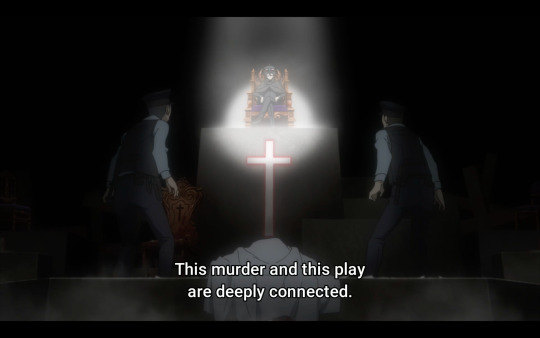
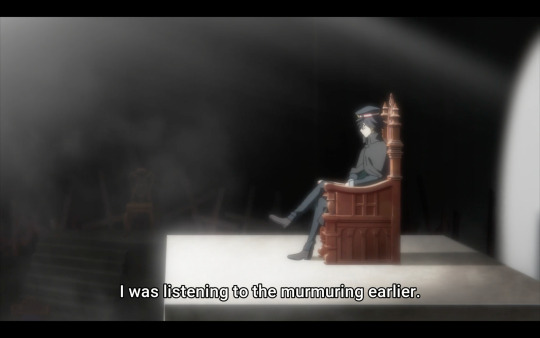
first of all, the imagery of him being on a throne directly calls to his self-proclaimed new status as the “world’s greatest detective”. but what’s also interesting is just how high up he is.
it’s not so clear in those first screenshots, but here, you get this very clear view of how high up he is. he’s on the tallest level of the stage, above murakami, the policemen, and the audience.
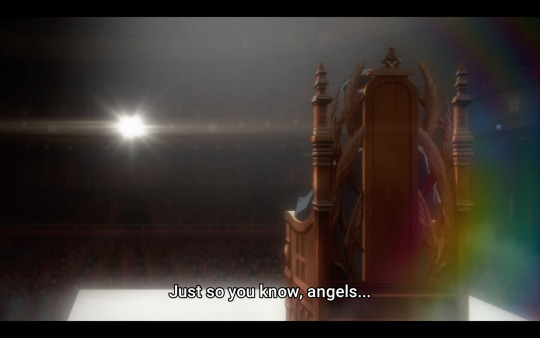
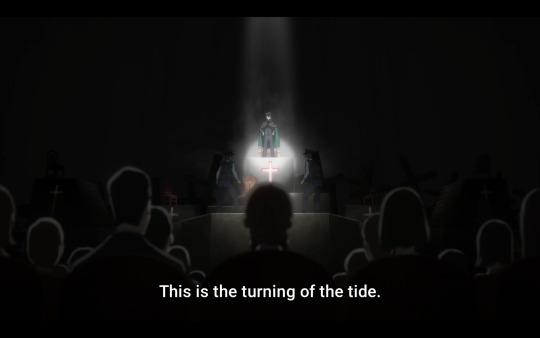
this whole sequence takes place after fukuzawa hands him those infamous glasses, and tells him that he’s gifted. ranpo believes he’s an ability user, and so, this separates him from the masses in his mind, who are visually represented here by the audience on the ground (including fukuzawa, who hasn’t discovered his ability yet at this stage). and this not only separates him from them — it elevates him. putting him on, not only the stage, but the highest part, emphasises the difference in his self-perception. he is different from the regular ‘monsters’ because he is an ability user: a rarity, an urban legend of sorts.
even here, when the police officer (who is definitely not suspicious at all) comes over to compliment ranpo and fukuzawa, the concept of levels is at play. this police officer is, to our current knowledge, a regular, non-gifted human. he even expresses shock and awe at the fact that he’s in the mere presence of an ability user. ranpo is at the top of the stairs, again, emphasising his position as a gifted ability-user, someone beyond the skills of a regular human.
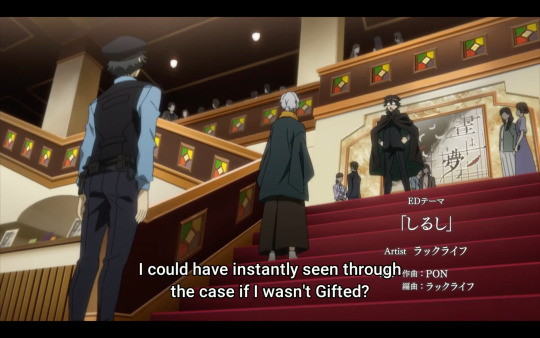
and ranpo’s (literal) elevation, especially in the stage scene, is also linked to the themes of the play itself, i’d argue. and like, full disclosure that i’m long overdue for a reread of untold origins since my memory is very blurry at best, so i’m just going to be basing this off what the anime does with the play (since, after all, this is a post analysing the relevance of positioning and layers/height/elevation in the anime).
at the start, it’s stated that angels are ‘gifted’ beings — and the word used here is, to my knowledge, the same as the word for ability user (please correct me if i’m wrong!). so the association is immediately established: gifteds — ability users — are strong, beyond human comprehension, and powerful enough to strike a fallen angel down. so that is to say, stronger than the normal, status quo.
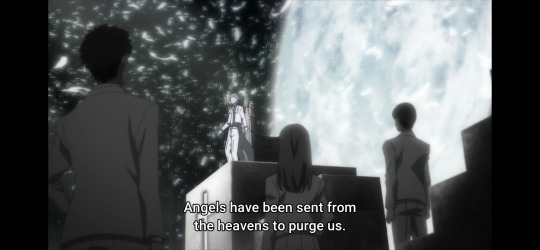
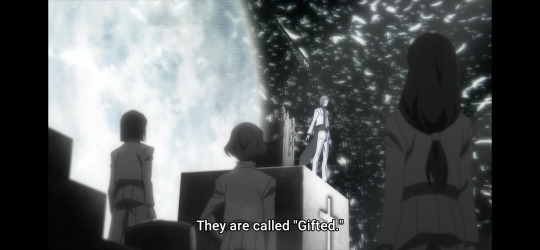
there’s religious (largely christian) imagery written all over the stage. at the start, one of the fallen angels in the play is ‘murdered’, and the imagery behind is undoubtedly a nod towards the crucifixion of jesus. and this position and framing here very much reminds me of an altar. especially with murakami’s ‘corpse’ under the (white!) cloth.
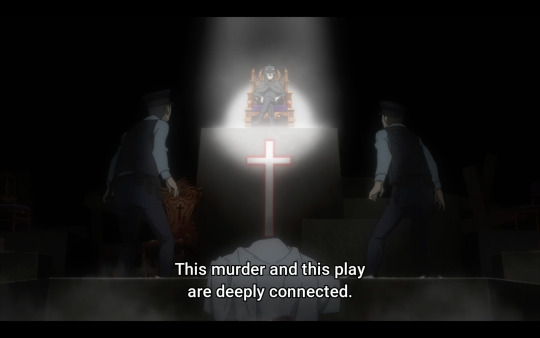
ranpo’s position, above everyone, being deliberately above the cross, the centre of the spotlight — it’s almost as if he is some higher being. something there to cast judgement above all. something like… an angel. who are gifted beings, according the play, as he himself believes he is, since he’s been dubbed an ability user by fukuzawa.
indeed, the murder and the play are deeply connected — but so’s the symbolism of ranpo rising above everyone else and the concept of ‘gifteds’/‘ability users’ and the concepts laid out in the play. at least, in my view.
positioning has always been used in the BSD anime to display power dynamics and relations, and it’s a similar concept here. the subtle details make all the difference to the way we view the anime, i think. and that’s the power of visual storytelling!
#bsd#bungou stray dogs#bsd spoilers#bsd season 4#bsd s4 spoilers#bsd s4#bsd season 4 episode 2#bsd analysis#bsd anime#bsd anime analysis#edogawa ranpo#ranpo edogawa#bsd ranpo#bsd fukuzawa#fukuzawa yukichi#briefly talked about this on twitter but i’m fleshing it out a little more#my brain is mush so it doesn’t make that much sense but oh well#but there’s something to be said abt the religious imagery the anime used here n how it’s relevant to ranpo#am i reaching? probably. but no one can stop me!!#jem rambles#jem's bsd analysis
403 notes
·
View notes
Text
Religious Imagery and Symbolism in Eli Ever:

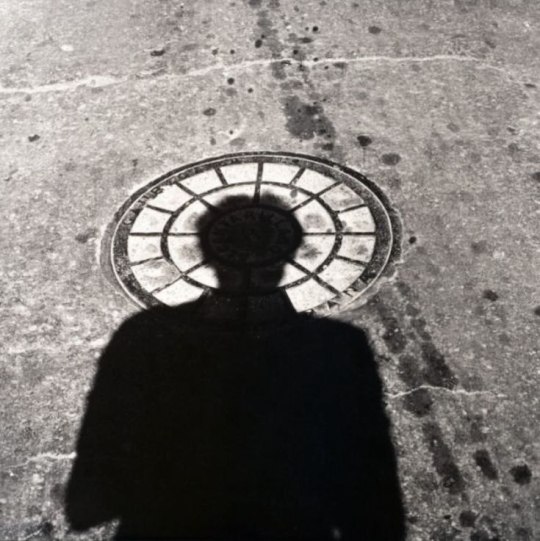
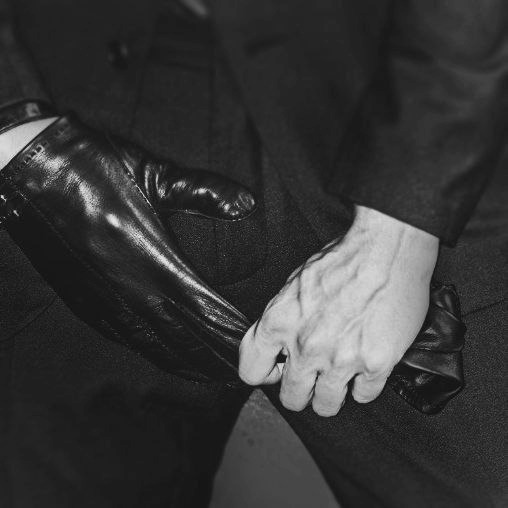
Note : everything in this analysis was or could have been linked in a more generalized and not necessarily true theology, only as a way to try to associate or make connections with the mentioned character.
Baptism
His first death can be likened to a Baptism.
Baptism is a Christian sacrament of initiation and adoption, almost invariably with the use of water. It may be performed by sprinkling or pouring water on the head, or by immersing in water either partially or completely, traditionally three times, once for each person of the Trinity.
" The baptized person emerges from a watery grave into a new life."
Baptism is a symbol of Christ’s burial and resurrection. The entrance into the water during baptism identifies Christians with Christ’s death on the cross, His burial in the tomb and His resurrection from the dead.
The parallel between Eli's first death and baptism is evident. Just as a baptized person emerges from a "water tomb" into a new life, Eli undergoes a transformation after his first death.
"signifies that "you" have died to your old self and sin, emerging as a new creation."
This means that, in the same way, Eli's death represents a passage into a new phase, where he leaves behind his previous "self", emerging as a new creation, almost like a rebirth.
“Going under the water was a burial of your old life; coming up out of it was a resurrection, God raising from the dead as he did Christ." Colossians 2:12-14
Furthermore, there is an evident connection between sin, death, and God's gift of eternal life. As mentioned next.
"For the wages of sin is death; but the gift of God is eternal life through Jesus Christ our Lord." Romans 6:23
Three
The Christian doctrine of the Trinity is the central doctrine concerning the nature of God in most Christian churches, which defines one God existing in three coequal, coeternal, consubstantial divine persons: God the Father, God the Son and God the Holy Spirit.
The Christian Church has celebrated the resurrection of Jesus Christ on a Sunday—three days after remembering his death on Good Friday. This timeline of three days is based on numerous references in the New Testament. Jesus predicted it many times, the three-day timeline matters to the biblical narrative because it is the special day on which God creates new life and activates his covenant with humanity.
three times he shot victor.
three years since they met.
three times he died ( manifesting he coming back and dying again)
" He met his gaze in the mirror and began to unbutton his shirt, exposing the scars from the bullets of Eli’s gun one by one. He ran his fingers over them, touching the three spots where he’d been shot the way a man might cross himself." Part One; Chapter XXVI , Vicious.
In the Bible, we can find more examples of the use of the number three as sacred or a persistent and symbolic repeating pattern, but I only mentioned these few situations that I found relevant or that fit the narrative of 'Vicious'.
Cross
The Cross, is the principal symbol of the Christian religion, recalling the Crucifixion of Jesus Christ and the redeeming benefits of his Passion and death. The cross is thus a sign both of Christ himself and of the faith of Christians. In ceremonial usage, making a sign of the cross may be, according to the context, an act of profession of faith, a prayer, a dedication, or a benediction.
"to outline the form of a cross as a Christian religious act by moving the hand from the forehead to the breast and then from one shoulder to the other, seen as representing the trinity: Father, Son and Holy Spirit."
The use of blood as part of a ritual is laden with symbolism.
"Wouldn’t You?” He cut deeper, through to bone, over and over, until the floor was red. Until he’d given his life to God a hundred times, and a hundred times had it given back. Until the fear and the doubt had all been bled out of him. And then he set the knife aside with shaking hands. Eli dipped his fingertips in the slick of red, crossed himself, and got back to his feet. "Part Two; Chapter IV, Vicious.
In the context of this specific text, Eli blessing himself with his own blood appears to represent a desperate quest for answers and validation from God regarding his identity and the powers he possesses.
This action can be seen as an extreme act of devotion and sacrifice. It may represent the intensity of Eli's search for a divine answer or for God's forgiveness. Making the sign of the cross with his own blood suggests that he is willing to sacrifice or suffer in search of a deeper spiritual connection or proof of divine will.
Blood, Red & White
"And by the law almost all things are made clean with blood, and without blood there is no forgiveness." Hebrews 9:22
In the Old Testament, animal sacrifices were a means of seeking forgiveness and reconciliation with God. The shedding of blood in these rituals symbolized the payment for sins.
The New Testament sees the shedding of Jesus' blood on the cross as the ultimate act of redemption. Christians believe that through His blood, believers are forgiven of their sins and reconciled with God.
And also associated with purification and cleansing.
As we know, Eli associates his murders with a distorted view of divine justice. He believes he is eliminating those people he considers unnatural or threats to society, as a purification, justifying his murders as a way of protecting the world from “villains” with extraordinary powers, this vision can be easily associated, by the way he thinks and acts throughout most of the narrative as a clear link to the Christian view of sacrifice and blood itself.
Red, associated with sacrifices, sin, power, sinfulness. can be conected with redemption and atonement. It represents the idea that through Christ's sacrifice, believers can be cleansed of their sins and find redemption, also linked to martyrdom. Martyrs who died for their faith are often depicted wearing red, symbolizing their willingness to shed their blood for their beliefs.
&
White, purity, innocence, righteousness. Associated with the idea of resurrection and new life in Christ. It signifies the hope of eternal life after death, it can also represents the state of being free from sin.
And for red and white, which are colors normally associated with the character as they continue to be described with him in the narrative or mainly associated with the vision that people have of him, with white clothes, gun and glasses being one of the easiest ways to identify him, we can see that both colors connect with sacrifice, martyrdom, purification and eternal life, which are elements present in the character and his narrative.
Name.
In the Villains series, the name theme remains, whether in a satirical way, a reference to comic books or just a way of demonstrating what a character represents.
Eliot means “The Lord is my God", “Jehovah is my God.”
With the meaning of his name I would like to close this brief summary that I tried to make about the symbolism that I could notice predominantly in the narrative of his character, from his name to the meaning of eternal life and the usual theme, we can see that Eli is a character strongly linked to religiosity and can be easily associated with various concepts of Christianity.
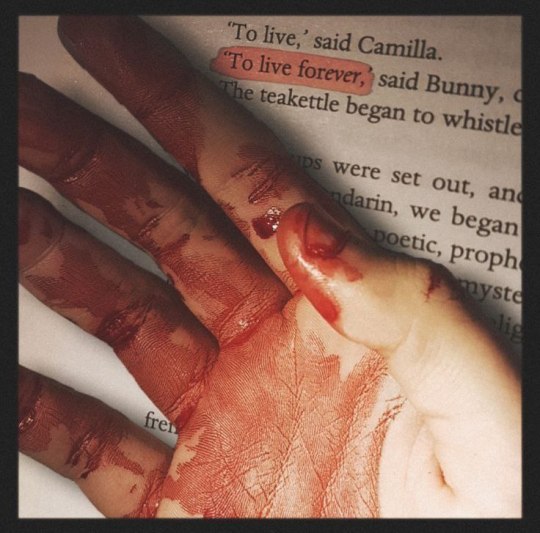
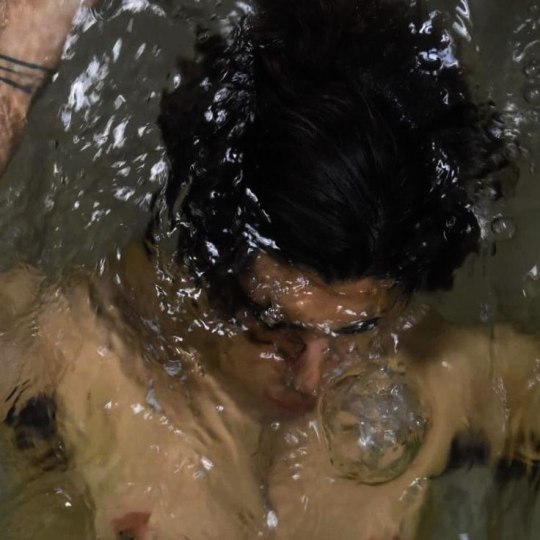

Final Note: Thank you if you read this far and I hope you enjoyed it.
#Eli Ever#Eli Cardale#vicious ve schwab#villains series#eli ever#little analysis#finally did it#vengeful#vicious#v.e schwab
106 notes
·
View notes
Text
I've talked about this in other places but y'all I need you to understand what a brilliant name "Pan" is for Goku's grandkid. Like. Holy shit.
So, let's talk about Goku for a moment. The name Son Goku is the Japanese version of Sun Wukong, the Monkey King. As is well known, Dragon Ball draws its roots from Journey to the West, with Goku and Bulma filling the roles of Sun Wukong and (very ironically) the monk Tripitaka.
Japanese being a very complex language, the kanji of Goku's name can be read in multiple ways. The most significant being "To perceive the sky", building off the key symbol "Go" which stands for a heightened sense of awareness or understanding.
The names of Goku's family are all centered around Go. It's also, specifically, the kanji he wears on his dogi from his arrival on Namek forward.
Gohan, on the other hand, is a funny joke playing off of Goku. "Gohan" is food. It can be used to refer to a meal entirely, but it specifically means "rice". Or, if you want to be spicy with Goku's name meaning, "To perceive the rice", since the rice portion is specifically "han".
There's no shortages of gags about Gohan's name throughout Dragon Ball. My personal favorite comes from Cooler's Revenge. Goku comes across Cooler's minions at what was supposed to be a fun camping trip, one restraining his son and the other eating from the protags' cookpot. He demands that they "Put down my Gohan!" at which point the one evil minion tosses aside the pot of rice.
So that's Gohan. On the other side, we have his wife, Videl.
Toriyama groups characters by puns. Bulma (Bloomers) is the daughter of Briefs and the mother of Trunks and Bra. She also has a sister named Tights.
In the Cell arc, we're introduced to Mr. Satan. Can you guess? Can you guess what his daughter Videl's name is an anagram of?
So. Here we have these two characters, Cooked Rice and the Devil, who have a child together. What do you name that kid? Whose naming theme do you follow?
Well. Why not both? "Pan" is the Japanese word for "bread", following theme from "rice". It's also the name of a satyr from Greek mythology, whose iconography inspired the goat-legged and cloven hooved imagery commonly associated with Satan in Christian mythology.
That's fucking brilliant. It makes me sad when people take Dragon Ball too seriously 'cause Toriyama's out here doing pun calculus for his silly characters and their goofy names.
EDIT: I kinda thought this would just get a couple likes and be forgotten but if people are going to keep reblogging this then I need to correct a boneheaded mistake I made.
54 notes
·
View notes
Text
Before I begin my review, I want to issue several huge trigger warnings for: mentions of sexual assault, catholicism, religious guilt and trauma, religious zealots, and animals being in dangerous situations.
American Rapture
CJ Leede
Rating: 🕯🕯🕯🕯🕯 (5/5)
As of writing this, I have just now finished American Rapture. It is my first book by CJ Leedes, and one that I have never seen recommendee anywhere, always overshadowed by Maeve Fly, which is on my TBR next. This book, in my opinion, has earned itself a spot on every bleak/disturbing/horrifying/not-for-the-faint-of-heart horror novel must read list for the next several decades. I went into this completely blind aside from knowing it was about the end of the world, and the protagonist is a young Catholic girl. If you haven't read this book yet, I recommend you put this review down and go read it as blindly as I did. Come back after, and please let's discuss.
SUMMARY: A virus is spreading across America, transforming the infected and making them feral with lust. Sophie, a good Catholic girl, must traverse the hellscape of the midwest to try to find her family while the world around her burns. Along the way she discovers there are far worse fates than dying a virgin.
MY DETAILED REVIEW (SPOILER WARNING): Throughout my entire read, I found myself thinking of ways to open up my review about this book, searching for anything that would encapsulate the experience that reading it was. Nothing felt quite satisfactory; this book is so much more than I could ever possibly articulate.
I come from a background of Christian zelots myself. My grandmother is Catholic in all but name; she refuses to worship or acknowledge the Virgin Mary the way Catholics do, but every other belief of theirs is one she has. Sophie's deep, internalized guilt that follows her through a majority of the book is one I am all too familiar with, and it is a fantastic story of outgrowing and leaving behind the cultlike beliefs of the Catholic church.
The way that her beliefs colours her experience of the apocalypse is a unique one that I haven't ever seen before, and this book had me in a chokehold from start to finish. It did take me roughly a week to finish, though, because I had to take frequent breaks for my own health.
This novel is a nonstop rollercoaster of the worst, most bleak moments possible (Wyatt, with his throat cut open by "God's righteous soldiers", Barghest, burning to death to defend the owner he has known so little yet loves so much) with the most hopeful (Maro, finding a young girl alone in an apocalypse and helping her so much further than he was expected to, Sophie, finding Noah's origami crane and later realizing where he is). I always knew when something bad happened that something good was coming up next, but this also worked the other way around. The scene of Helen, Ben, and Sophie all watching Romeo and Juliet in the House on the Rock comes to mind. I had to take a break when it began mentioning Helen being asleep; I knew things were going to pick up again.
Wyatt's screams were a good red herring for that situation, to have us think it was a nightmare for it to later come out Helen is infected. The imagery evoked of Helen chasing Sophie through the world's most frightening and disorienting funhouse was fantastic, too.
The brutality portrayed by the Crusaders is a brutality I think most people are familiar with these days. It isn't always Catholics, but isn't it funny how it's always rooted in Christianity in some way, their hate? If my grandmother wasn't well into her seventies, I think she would be a Crusader in this situation, too.
And what a self-rightous, dick-sucking name to give yourself, too. Crusaders. What a cult.
Anyways, my review is very obviously coloured by my own religious trauma, but I do absolutely love American Rapture. It's top of my list to be bought now, and Maeve Fly is on my TBR, right next to American Gods, which my friend has been asking me to read.
Overall, if you still haven't read the book and want to now, after I've spoiled everything for you, it's still worth a read. Just be aware, it is a very, very heavy read.
#book review#book reviews#booklr#book tumblr#bookblr#horror#horror lit#horror literature#horror novel#american rapture#cj leede#5/5
5 notes
·
View notes
Text
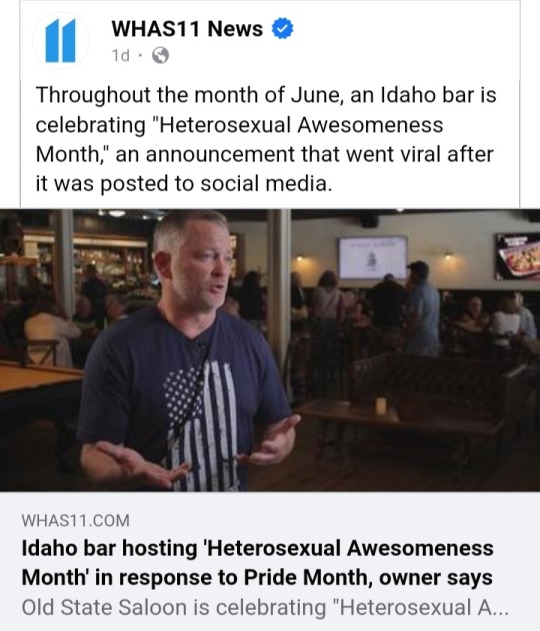
"The imagery that you see a month with parades and getting to the point of nakedness and things with people walking down the street, I can't get behind that," he said.
Fitzpatrick later said he doesn't know if it's happening locally because he hasn't been to Boise during its pride festival.
"People are walking around naked! I assume"
Throughout June, Old State Saloon will celebrate Heterosexual Awesomeness Month. On Monday, any heterosexual man can get a free beer, as long as they are dressed like a hetero man. On Wednesday, there is a deal on food for hetero couples and Thursdays are set aside for hetero women.
"No free beer for you, those clothes look kinda fruity"
But possibly the best part is the opening of the article
BOISE, Idaho — An Eagle bar has gotten local attention in the 18 months it's been open after holding promotional events such as Conspiracy Theory Trivia Night – where you can win an AR-15 – Christian singles mingle nights and hosting flat-earther events. However, that attention is nothing compared to the global reach they've received with their latest promotion.
Wow. Sounds like a real winner
14 notes
·
View notes
Text
come all ye sinners
Pairing: John Marston x gn!reader
Summary: Driven from camp in the aftershocks of an earth-shattering shift in John and Abigail’s relationship, you find yourself in an unlikely situation with and even more unlikely ally. Is there a way forward?
Warnings: Gratuitous religious (Christian) imagery/blasphemy/etc., angst, alcohol abuse and intoxication (vague), strong language, lots of dialogue, extremely complicated feelings and situations lol
Word count: 2,464
A/N: AAAAAAAAAAAHHHHHHH!!!!!! that is all <3
Series masterlist • AO3
—
Your hands ache with the repetitive scrubbing motion as you clean years and years worth of grime off the headstone of Dear Albert C. His is only the latest; you’ve been at this all morning. It takes a few more minutes of scouring against slate to reveal the full inscription:
Dear Husband
ALBERT CALLOWAY
1816 - 1889
The one beside him is for Loving Mother and Wife, Catherine. The one next to her is Dear Departed Maggie. The whole churchyard is filled with graves just like these; epitaph after epitaph on faded stone. Loving Sister. Our Angel Departed. Thou art Gone but Remembered. Even half-eroded and covered in moss the love buried on these grounds threatens to overwhelm you. It makes you think of a different church with chipped white paint, of a different graveyard with different names carved carefully in stone. Your parents wasting side by side beneath the unforgiving red dirt of New Austin, where you haven’t paid pilgrimage in years uncounted.
You’re sure that if you try to step foot in any chapel these days you’ll catch fire. Even the hallowed ground of this graveyard burns, but when the local Reverend asked for help you weren't exactly in a position to refuse.
Early last week you rode into town, renting a room at the hotel and then drowning yourself in whiskey at the shittier of Valentine’s saloons. You just had to get away from camp. It was suffocating. Ever since Abigail pulled John aside—
Well, it hasn’t been good.
No one knows what it is she said, but everyone knows that they’re not together anymore - really and truly split apart - and neither one has spoken to you since.
Even as you’d helped John pitch his own tent on the other side of yours he’d avoided your gaze, ignored your questions and your consolations entirely. When you’d tried to ask Abigail over dinner that night if she was alright her red-rimmed eyes looked everywhere but at you. The fire. Her stew. A patch of sky and sunset behind you. Normally Arthur, at least, would break down enough to tell you something, but he’s still out near Strawberry - murdering half a town with Micah, if the papers are true.
But being ignored you could have handled. The pointed stares ranging between annoyance and pity were what drove you to leave without so much as a goodbye.
You didn’t run far - only Valentine. The whole town wishes it had been farther; you’ve made an ass of yourself here. Between the bar fights and public intoxication it’s a wonder the sheriff hasn’t just locked you up. After drowning yourself in whiskey and fighting half the other patrons you’re banned from Smithfield’s for at least a month, if not for life. The grocer at the general store will barely sell to you, and the only reason you haven’t been kicked out of your hotel room is that you paid cash upfront.
Keane’s is your last refuge, the rickety old saloon beside the churchyard, which of course is how you got yourself into this latest predicament. You drank yourself under the table with the bar’s only other occupants last night. All the stories about Jim ‘Boy’ Calloway hardly do justice to the way that man drinks. His bespectacled friend ought to go down in the history books beside him, the way he kept pace. The three of you drank and drank and drank some more, weeping into your cups about lives gone by, until finally Ned had enough and closed the place down. Mindless with drink you’d stumbled out the doors and into the street and right into something. Someone.
You’d snapped instantly - slurred, really - like it wasn’t entirely your fault.
“Apologies, my child,” a serene voice had said.
“Ain’t nobody’s child no more.”
You’d shoved whoever it was out of the way with a snarl and promptly lost your balance, falling flat on your face and into the mud Valentine is so famous for. It’s hard to remember much after that. A voice calling out in concern. Gentle hands helping you up. A shoulder to lean on.
Then nothing.
You woke this morning to sunlight streaming in your eyes and a pounding headache. The room you were in was small and humble and entirely unfamiliar. It smelled of incense. Burnt-out candles. Hope, somehow.
“Oh, good,” an almost-familiar voice had called out, “you’re awake.” An older man of the cloth with kind brown eyes and a shock of white hair over a wise smile trundled into the little room with a mug of coffee and some bread. “I am Reverend Hampton. You were quite unwell last night, so I brought you here to recover.”
“Where the hell is here?”
He’d smiled at that like he was in on some joke you didn’t know about. “The House of God.”
“Oh, Jesus Christ.”
Your blasphemy had him laughing out loud, of all things, and once you fought to keep his proffered breakfast down he had asked, sweet as you please, if you could spare a few hours helping an old shepherd tend to his flock after you cleaned up. You thought maybe you’d be lighting candles for a service or hefting around pews he could no longer move, but since the sun peeked out from behind the Grizzlies’ distant peaks it’s just been you and a scrub brush and a bucket of murky water against the time and decay that has hidden Valentine’s past lives and lovers from view.
—
You work well into the afternoon. There comes a point when your mind is quiet and your hands are raw, and that’s when Reverend Hampton finally reappears.
“So many names I have not seen in years,” he says, hands brushing over headstones like old friends. “Thank you, truly.”
“I owed you after last night,” you grumble.
His easy praise makes your ears burn with shame, but he just gives you another one of those secret smiles. “God smiled upon me indeed when our paths crossed.”
“You’re about the only person to think so,” you huff out a disbelieving laugh. “Is that what you were doin’ outside a saloon at closing time? Looking for lost souls?”
“I was trying to find Mickey, our resident vagrant. I had brought a blanket for him since the nights are still chilly, but…”
“But I ran into you instead,” you finish for him. “Sorry again.”
He waves your apology off with a weathered hand. “I have found that the people who need the most guidance are not the faces I see every Sunday at my pews. Charity sent me out of the church doors so late, but Providence brought me you.”
“If your God sent me, he must not like you all that much.”
“I don’t know about that,” he laughs softly and takes a seat on the ground beside you, despite the ache it’s sure to cause his old bones, “but I do know He very much likes looking out for those in need.”
“No offense, Reverend, but what could I possibly need from you or Him?”
“A kind ear to listen, perhaps? Something is weighing you down. Where better than here to unburden yourself, with only me and the ghosts to listen?”
“I ain’t the confessing type.”
“It’s nothing so serious, I assure you. Think of it as a conversation between friends.”
You scoff, but it lacks your usual bite. “We ain’t friends, Reverend.”
His eyes sparkle with endless patience and good humor. “We could be.”
And so, in spite of everything, you start talking.
All your troubles come tumbling out bit by bit. Each story is veiled behind the ambiguity of a killer on the run, and he’s certainly sharp enough to know you’re not the saving kind, but he listens like he cares. Like you really are friends. You tell him how John rescued you when you were just kids, and somewhere in between growing up you realized it would be you and him forever, ‘til the end of it all. How even after he left for a whole year you never once stopped believing that someday it’d be the two of you in twin graves with matching headstones just like the ones you lean against now. You try to explain the broken family he has with Abigail, now fractured further, and how it’s really your fault because you urged Arthur towards happiness even when you knew, deep down, no one would end up happy. How no one will talk to you and it’s just what you deserve but that doesn’t mean you can take it, so you tried to drink it all away and didn’t even get lucky enough to drown.
Now here you are, run out of camp and proved right. Some ruined phantom haunting the life you almost had. Haven’t you just lived up to your name? And doesn’t it feel so good to be a harbinger of doom on the outside looking in, scribing the writing on the wall with your own blood?
You don’t even realize you’re crying by the end until the Reverend offers you an embroidered handkerchief from his breast pocket. The better part of the afternoon is gone now. Early evening sun does its best to warm you with the late spring grass. Birds sing sweetly overhead. The smile Reverend Hampton gives you is just as saccharine.
“Sorry,” you croak. “Didn’t realize I’d be such a fuckin’ mess.”
“It’s alright,” he says, still with that gentle smile. “Let it all go. You’ve held on so tight for so long. Let me be here to catch you today.”
You’re not sure how long you sit there beside the now-clean graves of Valentine’s churchyard with the Reverend’s calming hand on your shoulder and his handkerchief in your hand. It takes several shuddering breaths before you come back to yourself. You rise slowly, extending a hand when he tries to do the same. He surprises you by going in for an embrace once he’s up, but where yesterday you pushed him away, today you pull him close.
“I don’t know how I’ll ever repay your kindness,” you say into his shoulder. “We both know I ain’t done much to deserve it.”
He pulls back to give you that bemused smile once more. “Kindness isn’t about deserving, dear child. Go in peace, and know you will always have a friend here. Always.”
You chance one last glance over your shoulder after saying your goodbyes. He waves serenely from the church steps, haloed by stained glass and goodness. For the first time in what feels like forever, your steps are light as you head towards home.
—
If Karen is surprised to see you back she doesn’t say so, offering a dry salute from her post instead as you ride into camp. You tip your hat to her and smile as best you can past the nerves. The optimism only lasted as long as the churchyard was in view.
You have to talk to John. Get him to talk to you - it’s all the same in the end. Just as terrifying any way you frame it.
Once you’ve dawdled as long as possible untacking and unpacking the little you’d brought to Valentine, you begin your search. He’s not in his tent. He’s never there this early in the evening, anyway, and though the thought crosses your mind that he might be away, the scowl on Abigail’s face across camp erases it. He isn’t occupying any of the logs around any of the campfires, even the one Javier strums tunelessly at. But just beyond it, leaning against a tree, you find him.
John says nothing as you approach. Doesn’t even look up from his book, though you know he knows you’re there. He looks like shit. His scars are fine - better, even, than when you left - but his skin is pale and the dark circles under his eyes are prominent. His hair falls in dark tangles around his face, and his brow is pinched like it gets when he’s worried or overthinking - or both. It’s hard not to stare at the razor edge his mouth cuts against the angles of his face.
“Hey,” you say. It’s stupid and not enough, but at least he looks up at you. The lightning in his eyes - anger and hurt and flash floods - almost makes you wish he hadn’t.
“Hey.” His isn’t as nice. “Surprised you came back.”
You fold your arms. “Surprised you’re talkin’ to me again.”
“What the hell was I s’posed to say, huh?” And here is the anger he had muzzled a week ago. Here is the wounded animal lashing out teeth first; His lip is curled, snarling. “What do you want me to say? You told Arthur to— Abigail left me.”
It’s worse, somehow, to face this quiet rage than the screaming match you sense itching beneath the surface of his skin. He wants to be angrier. Louder. Meaner. He doesn’t want another scene.
You haven’t forgotten that even blunted knives can kill.
“You think I don’t know that?” you say. “You think I don’t hate that? Look, if I could take it all back—” you cut yourself off with a frustrated growl. “I can’t take it back. Neither of us can.”
“So, what? I’m just supposed to forgive you?”
You can feel your eyes flash, affronted. Angry. Reverends are for forgiving. Saints and Christs and Gods. Neither of you is any one of those. There is no stained glass story painting your hurt in pretty colored shards over open doors and under tall steeples. There is no memorial of pain and sacrifice carved into any cathedrals. There is only you and him and this ugly, hurting thing between you.
“No, you ass,” you seethe. “You can hold a grudge forever, all I care. Never forgive me! Hate me, even. But if you think you’re getting rid of me you’ve got another thing coming. I ain’t never leaving you, John Marston. Not ever.”
He opens his mouth to argue further, only for it to snap shut just as quick when he registers what you’ve said. You stand there like that for a long moment. Chests heaving. Eyes burning. Just staring at each other.
“You’re a stubborn idiot,” he finally says, folding his arms and looking away.
You bark out half a laugh. “Takes one to know one.”
The sharp steel of his earlier glare is tempered soft in the golden evening glow. Something like forgiveness hangs in the air between you, shimmering.
When you stick your hand out for him to shake he eyes you for only a brief, wary second before taking it. His grip is calloused and warm. Gone too soon. But it’s done, and if there’s such a thing as salvation, you think it must be this.
67 notes
·
View notes
Text
Magical Gemstones: An Abridged Guide
Magical gemstones are a type of talisman made of semiprecious stones —such as hematite, carnelian or amethyst— that were worn set in rings or as pendants and their size ranges from 1.5 cm to 3 cm.These gemstones haven't magical, protective characteristics because of the nature of the gem itself but because the representations of Gods and holy names carved conceded them virtues through holy dynamis: This is, among other things, the inherent power of divine names and/or their representations.
These depictions are normally inverted (negative) This, together with the fact that some of the gems show a certain degree of worn indicates that they were manipulated in some way—probably rubbed or even licked, in order to increase their efficacy—proves that they were not conceived as seals but as amulets or talismans.
A magical gemstone, to be considered as such, should have one or more of the following elements:
An iconographic language generally belonging to syncretic Gods or that combines Gods from different origins.
Charakteres (magical signs. They can be planetary, protective, etc.)
Voces magicae (Words of power and phrases whose formulation and structure may hide secret, sacred names of Gods as well as prayers or incantations dedicated to them, sometimes with the intention of controlling their emanations and daimonēs) and logoi (magical names, permutation of magical names and vocals).
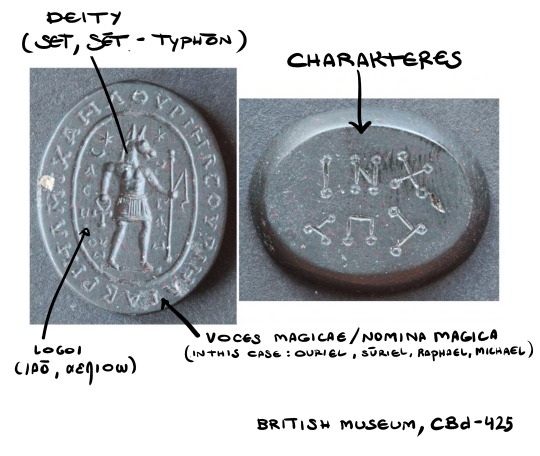
The practice and use of magical voices was transmitted orally across the eastern Mediterranean, but it wasn't until the early 1st century b.c.e. the practice began to be included in written form. The abundance of amulets and gems with magical names and signs are evidence of this change of paradigm.
In addition, elements are usually complemented by two structural features:
The gemstone is engraved on both the obverse and the reverse, sometimes even on the edge.
The inscription appears directly and not in mirror writing.
These magic gemstones, in addition, can be magical gemstones stricto sensu and amuletic gems. The latter differ from the former in:
That the iconographic patterns they contain are explicitly described as belonging to amulets in textual sources such as Posidippus's Lithika
They bear a prophylactic inscription, usually "diaphylasse" (protect me!), "sōzon" (save me!) or "Heis Theos" (One God).
Its production began during the late Hellenistic period, but it was not until the 2nd and 4th centuries c.e. that it reached its apogee. Magical gemstones' imagery demonstrates the diversity and plurality of Greek, Roman, Egyptian, Egyptian, Christian, Gnostic and Jewish representations and ideas from the Mediterranean from the Roman period, as well as the popularity and diversity of magical activities and practices.
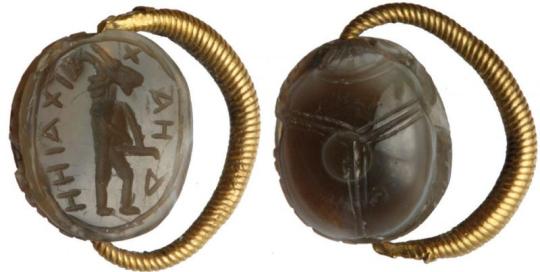
These magic gemstones were rarely used for evil purposes, such as harming someone. Their most common use was to offer protection or solve personal health problems: those showing an ibis tied by an altar and including the command "pésse!" (digest) were used to heal indigestion and other stomach problems; others, depicting a uterus, offered represented a womb, offered protection during childbirth and guaranteed fertility.
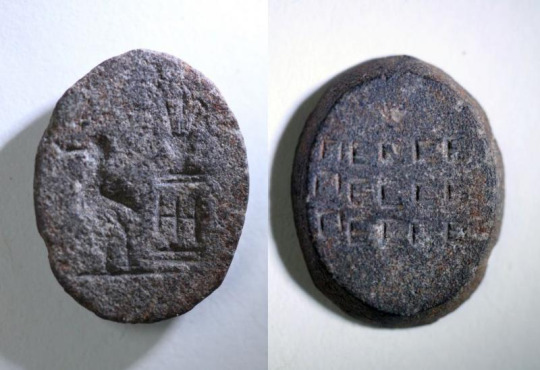

Although most of these magic gemstones were used as jewelry, it is possible that they also had other uses, as part of a ritual to heal a patient or as a physical component for an incantation, such as those with depictions of Harpocrates seated on a lotus the nomina magica Bainchōōōch (Bainchōōōch, Ba of the Shadow, isn't only a vox magica/nomina magica but a God on their own right. PGM aside, Bainchōōōch appears in Pistis Sophia as a triple powered deity that descends onto Jesus, giving him his powers)

An interesting fact is that of the production of magical gemstones during the 17th and 18th centuries of our era. Although the production of these gems continued during the Middle Ages and the Renaissance —irregularly, of course— they reflected the magical and religious reflected the magical and religious practices of their historical context.
This, however, was not the case during the 17th and 18th centuries, where magical gemstones of great quality and sophistication were produced, which not only reproduced the iconographic motifs and logoi of the pre-existing graeco-egyptian magic gemstones, but also introduced new ones. An example of these gems are those with representations of Christ-Osiris or Jesus-Khepri
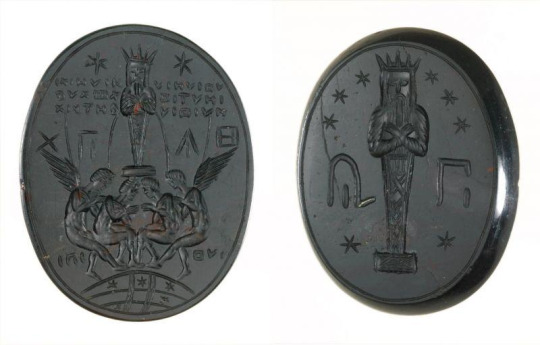
Sources:
Nagy, M. A., (2015) Engineering Ancient Amulets: Magical Gems of the Roman Imperial Period. in D. Boschung and J. Bremmer (eds), The Materiality of Magic (Morphomata 20). Paderborn, 205-240.
Faraone, C. (2018) The Transformation of Greek Amulets in Roman Imperial Times, Filadelfia; University of Pennsylvania Press.
Simone, M., (2005) (Re)Interpreting Magical Gems, Ancient and Modern en Shaked, S., Officina Magica: Essays on the Practice of Magic in Antiquity (IJS Studies in Judaica, vol. 4), Leiden; Brill, 141-170.
Campbell-Bonner Magical Gems Database (http://cbd.mfab.hu)
#magical gemstones#gemstones#PGM#Set#Sutekh#Set-Typhon#Sēt-Typhon#magic#religious syncretism#polytheism#egyptian polytheism#hellenic polytheism#kemetic polytheism#greek magical papyri#Bainchoooch#Thoth#talismans#amulets#talismanic magic
66 notes
·
View notes